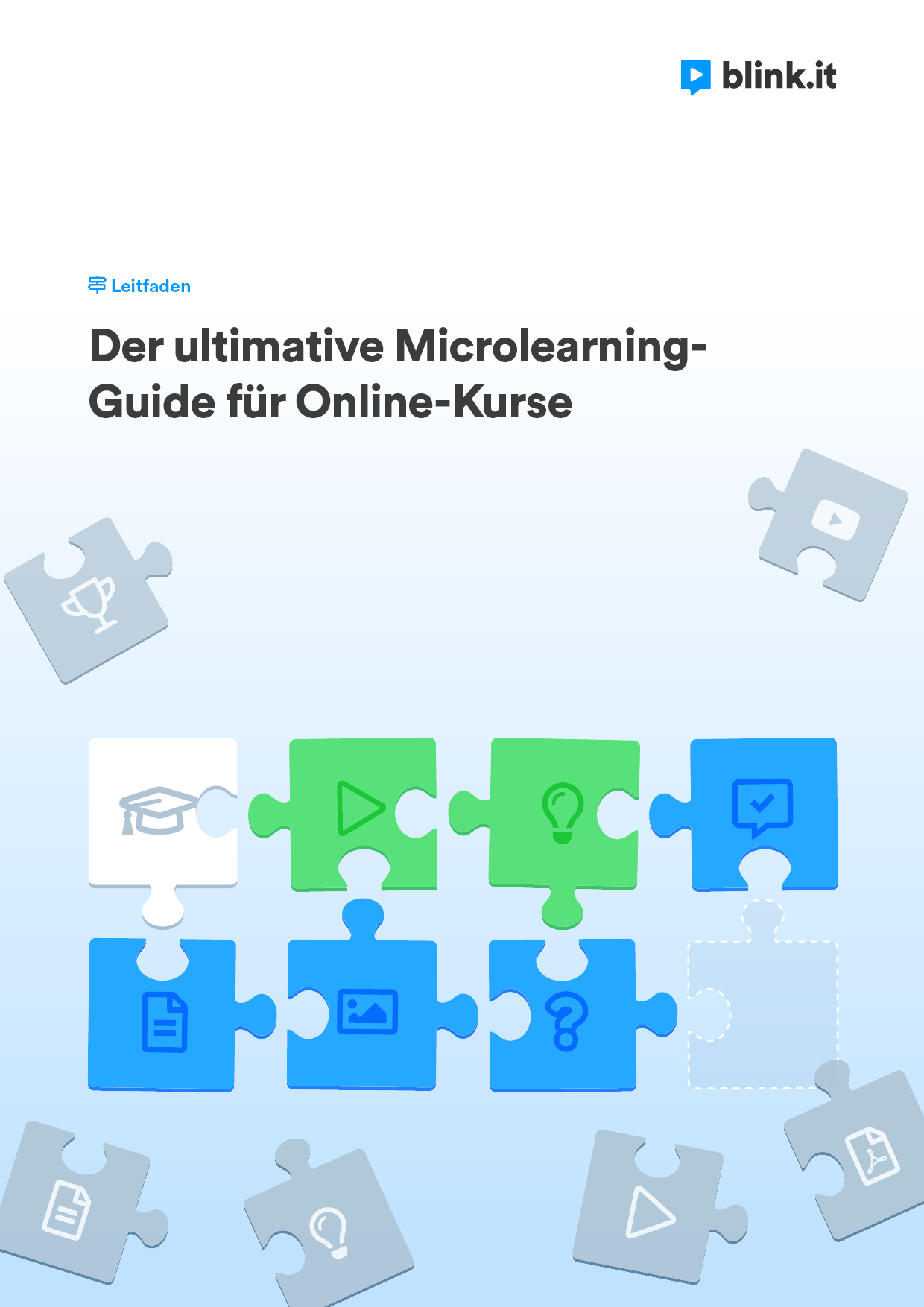In everyday life and at work, it helps to approach large projects step by step. That’s how microlearning works too: small learning bites create real learning transfer! Check out examples of microlearning now – as an alternative to complex instructions in daily life and as online support for training.
Update September 2020
The Ultimate Microlearning Guide for Online Courses
Start your own microlearning course now! In our new guide, you will learn step by step how to build your own microlearning. With many tips and examples.
The Idea Behind Microlearning: Short Learning Bites
Microlearning, bite-sized learning or Bite-sized Learning – all these technical terms aim at one idea: Simplifying the learning process by breaking it down into small bites. This works in corporate training just as well as in everyday life when you want to operate a device for the first time, for example.
Update August 2022: Are you interested in the topic of learning bites? Then read the article about Learning Nuggets (Definition + Examples) on our blog now! 💡

The Idea of Microlearning: Divide learning content into small bites so that they are easier to process.
If you want to offer content in the form of microlearning, you ideally start directly with small bites. How that works, I described some time ago here: Microlearning – 3 Rules for Creating Learning Bites.
Today I will present to you concrete examples of microlearning. Here’s how short learning content can look in everyday life and at work:
In everyday life: As an alternative to disliked instructions
At work: As an online course for corporate training
1. Example: Microlearning in Instructions
When was the last time you read an instruction manual? I mean – really read it? It’s probably been quite a while – at least that’s what a study investigating our behavior with operation manuals says. “Life is too short to RTFM” is the title of the study: Life is too short to read manuals.
The findings of the scientific study do not surprise us, but they do give us nice statistics on the topic of learning:
People read only about 25% of instructions for devices in everyday life.
The more educated people are, the less they read manuals.
The younger people are, the less they read manuals.
The reason: Instructions are often too complex and we associate them with negative emotions: Takes too long – Doesn’t help anyway – Doing it ourselves is faster! The trend is towards “learning by doing” – especially among educated and young people.
To not leave customers completely alone, more and more companies are reverting to the concept of microlearning. Often, not only is there a detailed guide for reading up on a specific problem, but also a very brief, usually illustrated quick-start guide for the first steps.
Microlearning in everyday life thus works best as a quick-start guide: As few steps as possible, presented as simply as possible!
Microlearning Example: Instructions for the Rocket Pack – Card Game for Blended Learning
The rocket pack is a card game for trainers looking for ideas for their blended learning. Along with a manual booklet with detailed descriptions, there’s also a card included that allows the user to start right away – following the principle of microlearning:
Three small steps
Little text, simply formulated
Clearly illustrated
Very action-oriented

Starting directly is more fun than reading the instructions first. More about the rocket pack at blink.it/rocketpack!
2. Example: Microlearning in Training
Our behavior with instructions shows how important learning in small bites is in all forms of learning. However, the content is not always as easy to understand as in the card game rocket pack. For long-term behavioral changes in corporate learning, a training participant often has to process many and complex contents.
Trainers often find it difficult to summarize their knowledge accumulated over years in two minutes. And don’t worry: In microlearning, it’s not about cutting down so much that only an empty shell remains! On the contrary: Content for microlearning is not only short but also very action-oriented.
As in this example from trainer Wolfgang Schneiderheinze, who addresses the topic of “filler words” in his online support in the form of microlearning: In just a little over a minute, a problem, a solution, and an exercise task for the participants is packaged – very brief, yet with a lot of content:
This is what Microlearning as Online Support Looks Like
The previously shown video is part of a complete online course as micro-content. The idea: to offer many short learning impulses following a classic face-to-face training.
This way, the training participant can gradually process small contents – ideally spread over several weeks to enhance learning transfer.
Integrated into a complete online course, microlearning can look like this:

Example of Microlearning with the learning platform blink.it: Green micro-contents have already been seen by the user; blue ones are unlocked but still unseen.
This is How Microlearning Works in the Online Course for the Participant
Basically, each tile (“Blink”) is a micro-content, so a small learning unit. It can be a video, a short text, or even a quiz. What’s important is that each blink in microlearning is associated with a specific call to action and is really quick to process.
The participant starts with the first blink and gradually works through the entire course – always with their own time allocation, embedded in their daily life.
How you can use these methods is shown in the following examples for microlearning. Here’s how the methods “Look forward to it”, “The Virtual Discussion”, and “Tickle the Detective in You” look when implemented in an online course:
1. Microlearning Example “Look Forward to…” (Category: Support)


2. Microlearning Example “The Virtual Discussion” (Category: Reflect)


3. Microlearning Example “Tickle the Detective in You” (Category: Understanding)


The outcome in all examples: Short learning bites with compact content that are perfectly suited for microlearning!







